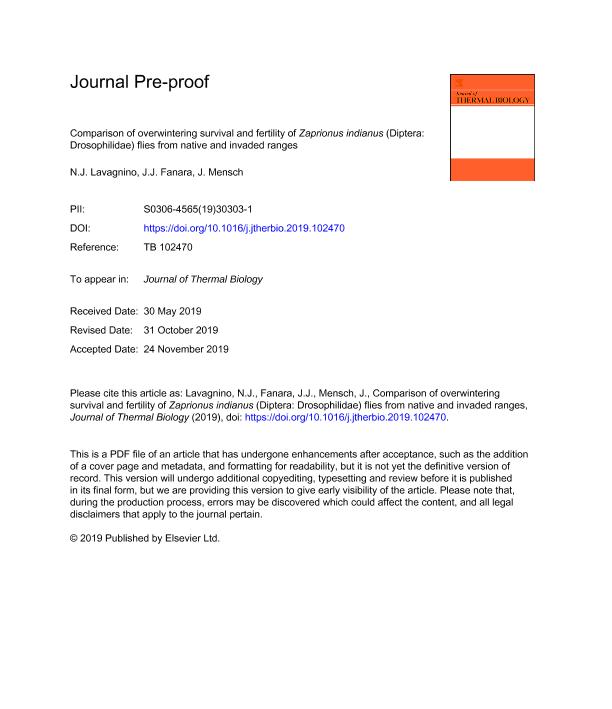Artículo
Comparison of overwintering survival and fertility of Zaprionus indianus (Diptera: Drosophilidae) flies from native and invaded ranges
Fecha de publicación:
11/2019
Editorial:
Pergamon-Elsevier Science Ltd
Revista:
Journal of Thermal Biology
ISSN:
0306-4565
Idioma:
Inglés
Tipo de recurso:
Artículo publicado
Clasificación temática:
Resumen
Zaprionus indianus is a fly species native to the Afrotropical biogeographic region that invaded the South American continent 20 years ago. Its southernmost record is 34°S in areas with temperate climates with cold winters. To better understand its invasion biology, we investigated physiological responses to winter-like abiotic conditions that may be relevant in Z. indianus geographic expansion. We characterized Z. indianus females reproductive traits (ovarian maturation and fertility) and survival in response to cold treatments with summer-like and winter-like photoperiods. We also compared these traits between native (Yokadouma, Africa) and invasive (Yuto, South America) range wild-derived flies. We showed that Z. indianus females have the ability to arrest ovarian maturation and maintain fertility following recovery from cold stress. The critical temperature for ovarian maturation of this species was estimated at c. 13 °C, an intermediate value between those of tropical and temperate drosophilid species. Wild-derived females from Yuto responded to winter-like photoperiod by slowing down ovarian maturation at low but permissive temperatures of 14 °C and 16 °C and also delayed the start of oviposition after cold treatment. Yuto flies also survived better and recovered 20% faster from chill coma than flies from Yokadouma. These results are consistent with a scenario of local adaptations or phenotypic plasticity in the invaded range, and suggest that photoperiod could act as modulator of ovarian arrest. Conversely, the fact that native range flies showed higher fertility after cold recovery than females from invaded range is not indicative of local adaptation. All in all, our findings report a set of physiological responses that would enable Z. indianus expansion to temperate and cold areas, but also results that are compatible with a limitation to the invasion process.
Archivos asociados
Licencia
Identificadores
Colecciones
Articulos(IEGEBA)
Articulos de INSTITUTO DE ECOLOGIA, GENETICA Y EVOLUCION DE BS. AS
Articulos de INSTITUTO DE ECOLOGIA, GENETICA Y EVOLUCION DE BS. AS
Articulos(OCA CIUDAD UNIVERSITARIA)
Articulos de OFICINA DE COORDINACION ADMINISTRATIVA CIUDAD UNIVERSITARIA
Articulos de OFICINA DE COORDINACION ADMINISTRATIVA CIUDAD UNIVERSITARIA
Citación
Lavagnino, Nicolas Jose; Fanara, Juan Jose; Mensch, Julian; Comparison of overwintering survival and fertility of Zaprionus indianus (Diptera: Drosophilidae) flies from native and invaded ranges; Pergamon-Elsevier Science Ltd; Journal of Thermal Biology; 87; 102470; 11-2019; 1-7
Compartir
Altmétricas




